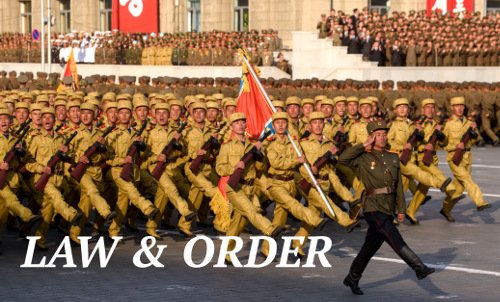
There are many phrases that people use which they never really think about. To them, such terms convey some general connotation or feeling, but if asked to give a specific definition of their meaning, most people flounder.
One such term is “law and order.” What people usually think of when they hear the term, or what they mean when they say it, is society functioning in an organized, predictable way, with people behaving properly, cooperating, getting along, and not acting like violent animals. I’m all in favor of that. However, that’s not really what the term “law and order” literally describes. In fact, most of the injustice and violence in history could be described as “law and order.”
In most people’s minds, “lawful” and “legal” have positive connotations. They imagine that it’s good to be “law-abiding” and bad to be a “law-breaker.” In their minds, the concept of “law” is fairly vague, but more or less signifies those rules that dictate righteous and proper behavior. In reality, that is rarely the case.

Those who have been raised to submit to the will of “authority,” and to think that civilized society requires “government,” when they hear the term “law,” tend to think of legislation which prohibits theft, assault and murder, for example. Surely those commands are just, and disobedience to them—“breaking” those laws—is wrong. However, most “laws”—most of the legislation that is enacted by various ruling classes—attempt to legitimize and authorize violent aggression, rather than prohibit it.
For example, if you look up the actual “drug laws,” you will see specific and clear threats to forcibly kidnap and cage anyone who is caught in possession of a certain plant without the politicians’ permission. In no way is that “law” a use of defensive force; it is purely and completely a threat of aggression. Most “laws” are. Indeed, throughout history and throughout the world, the number of horrendous atrocities that have been carried out in the name of “law” is simply staggering.
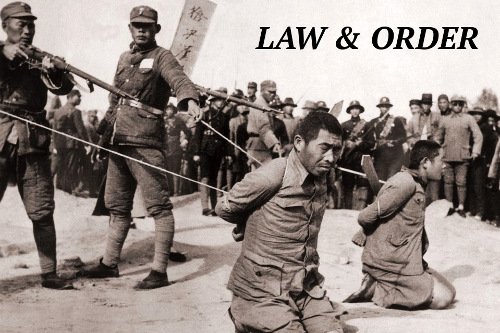
Governmental “law” is nothing more than threats issued by mere human beings. Whatever evil human beings are capable of, human beings can enact as “law.” History makes that pretty damn obvious, since “law” has been used to justify the oppression and robbery of billions of people, and the outright murder of hundreds of millions. Keep that in mind the next time you assume that “law” is a good thing, and that behaving in a “lawless” or “unlawful” manner is necessarily a bad thing.
While society being organized and orderly is obviously not a bad thing in and of itself, it’s also not necessarily a good thing in and of itself. The forcibly-imposed “order” seen in Nazi Germany, for example, was very efficient, regimented and organized. In fact, it might have been the most orderly example of authoritarian oppression ever. The Nazis had a clear chain of command, kept very good records, and their military functioned like a well-oiled machine. As such, the Third Reich might be the quintessential example of “law and order” in action. Thankfully, most people recognize that that is hardly an example worth emulating.
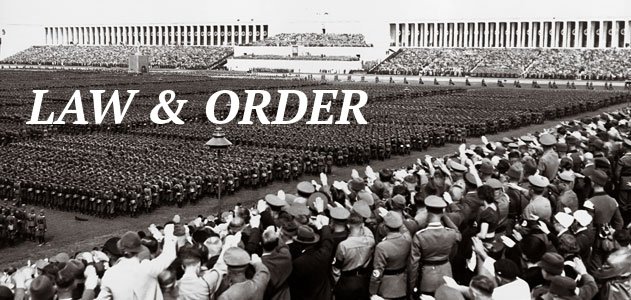
As with all human interaction, “order” comes in two flavors: forcibly-imposed order, and mutually voluntary order. Even extremely efficient, intricate, complex, large-scale organization can be created—and often is—on a purely voluntary basis, with everyone involved participating by choice. While the order is definitely helpful, it is the consensual nature of the arrangement that makes it praise-worthy.
Furthermore, “order” is only a good thing if it is accomplishing something worthwhile. For example, if a million people were spending day after day making hexagons out of dog poop, working in a very efficient, orderly fashion, would that be worth bragging about? No. Probably the ultimate example of how horrendous “order” via central planning can be was the “Great Leap Forward” in China under Mao Tse Tung. To make a long (and horrible) story short, it was a monumentally organized and orderly master plan … which resulted in tens of millions of people starving to death. Oh, and it was “legal.”
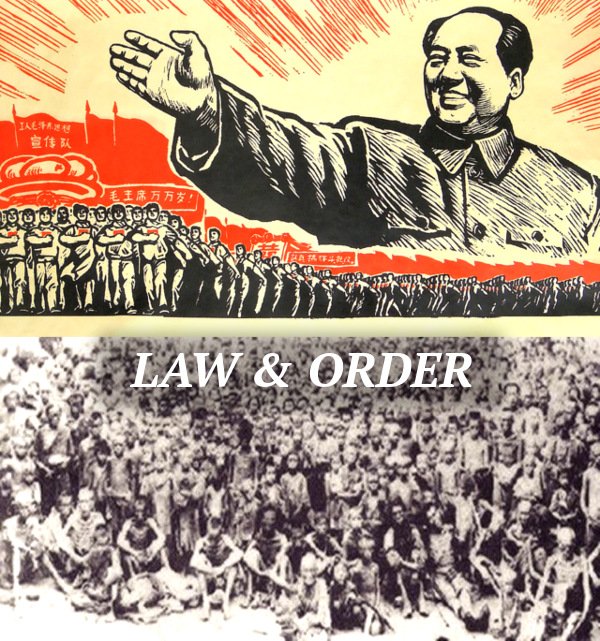
Just to pile on, one more example of a situation in which there is plenty of “law and order” is … prison. An excess of rules (“law”), along with strictly controlled and regimented behaviors, make the situation very predictable, standardized, homogenous, and “orderly.” Unless this is what you want all of society to be, stop talking as if “law and order” means civilization.
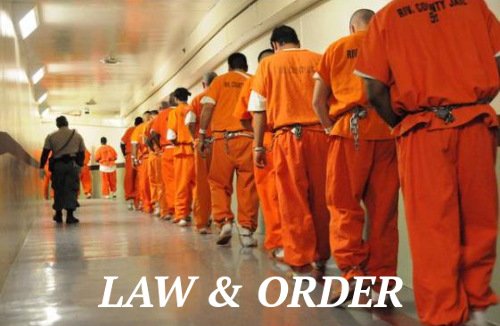
In conclusion, advocating “law” is, more often than not, immoral and destructive, as is advocating coerced “order.” Ironically, the good kind of order (meaning efficient, creative, productive, beautiful, peaceful cooperation and coexistence) spontaneously evolves best out of uncontrolled “chaos,” while the bad kind of chaos comes from the attempt to use violent control to create “order.”

Beautiful anarchy. :) That looks like PorcFest. I love seeing your content in this format, Larken. The well placed images really bring home your points.
Downvoting a post can decrease pending rewards and make it less visible. Common reasons:
Submit
Your articles are getting better all the time brother.
Downvoting a post can decrease pending rewards and make it less visible. Common reasons:
Submit
Natural law is right, man-made laws will always be inferior to them. If the law is not moral, then it is no law and it should have no authority.
Downvoting a post can decrease pending rewards and make it less visible. Common reasons:
Submit
Man's laws are either in opposition to natural law or they are redundant and unnecessary.
Downvoting a post can decrease pending rewards and make it less visible. Common reasons:
Submit
Does anyone else think it's weird and out of place to describe natural, mathematic, scientific (& etc) phenomena as 'law'? Particularly when the word 'law' is so saturated with arbitrary, made up bullshit?
Downvoting a post can decrease pending rewards and make it less visible. Common reasons:
Submit
Well, at least it's weird to use the word to mean both things. I'm all in favor of keeping terms like "law of physics," and stop calling the arbitrary BS issued by politicians "law."
Downvoting a post can decrease pending rewards and make it less visible. Common reasons:
Submit
Stop! In the name of the opinion! :D
Downvoting a post can decrease pending rewards and make it less visible. Common reasons:
Submit
The only Law and Order I respect
Downvoting a post can decrease pending rewards and make it less visible. Common reasons:
Submit
I was once in the background shot of a Law & Order show. Or was that NYPD Blue? Anyway, I hung out in the street, it was in L.A.. Sipowicz brushed my shoulders in the shoot and final cut heh.
Downvoting a post can decrease pending rewards and make it less visible. Common reasons:
Submit
Nice article, @larkenrose. I love seeing all this writing about anarchy on Steemit! It's becoming one of my favorite things about the site.
Downvoting a post can decrease pending rewards and make it less visible. Common reasons:
Submit
Re: Prisons "Unless this is what you want all of society to be, stop talking as if “law and order” means civilization."
You seem to know an awful lot of people who actually don't want all of society to be like that, and very few, if any, people who do want such a society, and for that I envy you.
Downvoting a post can decrease pending rewards and make it less visible. Common reasons:
Submit
Downvoting a post can decrease pending rewards and make it less visible. Common reasons:
Submit
Nice @larkenrose. Your articles always deliver the goods. Keep up the good fight, brother.
Downvoting a post can decrease pending rewards and make it less visible. Common reasons:
Submit